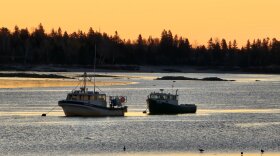-
In rural Washington County, Maine, there are pressing issues, such as the cost of living, that are getting more attention than climate change. There's also skepticism about it, even though the region's natural resource-based economy is inextricably linked to a rapidly warming sea.
-
Wild blueberries are native to Maine and have been for thousands of years. But as temperatures rise and droughts become more frequent, wild blueberry growers and researchers say they're looking for new ways to manage the iconic crop.
-
A small but growing number of Maine groups have set aside portions of their land and sold credits that require them to lock up a certain amount of carbon in the trees that cover it.
-
Scientists refer to fall as the most understudied season in climate change research. There are still a lot of unknowns. Yet, understanding the effect of climate change on foliage is critical for regions like Down East Maine, where fall tourism is a billion-dollar industry.
-
For more than a decade, the Ocean Renewable Power Co. has had its sights set on harnessing energy from Eastport's formidable tides, which average about 18 feet and can go as high as 26 feet. But the company still has no tidal turbines producing power, and doesn't expect to for at least two years.
-
For the last 150 years the Machias dike-bridge has prevented tides from flowing up into the Middle River. But the structure has deteriorated, and locals are divided over the plan to replace it with a more climate resilient bridge that would allow fish to return upstream.
Bangor Studio/Membership Department
63 Texas Ave.
Bangor, ME 04401
Lewiston Studio
1450 Lisbon St.
Lewiston, ME 04240
Portland Studio
323 Marginal Way
Portland, ME 04101
Registered 501(c)(3) EIN: 22-3171529
© 2026 Maine Public
63 Texas Ave.
Bangor, ME 04401
Lewiston Studio
1450 Lisbon St.
Lewiston, ME 04240
Portland Studio
323 Marginal Way
Portland, ME 04101
Registered 501(c)(3) EIN: 22-3171529
© 2026 Maine Public

Play Live Radio
Next Up:
0:00
0:00
Available On Air Stations
Scroll down to see all available streams.






